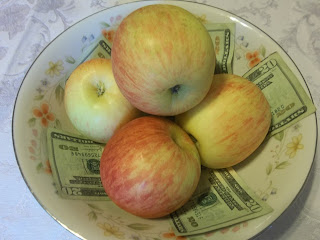Guys, I want to give you a fairly straightforward answer that won't make your eyes glaze over. Unfortunately, I lack the language to describe it simply and briefly. Let's let FOFOA say it for us:
...you can think of [freegold] simply as the dramatic devaluation of paper gold...So there it is. Freegold is a dramatic devaluation of paper gold. Wasn't that easy, kids? No? Well, shoot. I guess I'll have to try it myself.
Freegold doesn't mean FREE GOLD! ...as in, "Thanks for stopping by, have an ounce of gold." It means gold is free to act. I know it sounds silly, suggesting a lump of cold metal can take an action. It makes no difference if the lump of metal is chained to a floor or laying in a meadow
...the same amount of work is being accomplished. What is the "work" that gold accomplishes? Gold holds past labor for the future. We work, we add value efficiently and save the surplus. Gold is the best way to store the surplus. We talked about this in the "Why Do You Buy Gold?" discussion. Freegold, then, is when gold is fully able to satisfy its highest and best purpose: Wealth.
See the buffalo above? It says $50 on it. I would not sell it for $50. I can buy them at the coin shop for around $1,400. I would not sell ours for $1,400 and if I had $1,400 I would consider buying more! I'm not alone in holding tightly to my gold. Our own government has its share of financial problems. They have more gold than anybody in the world and they aren't selling. Greece, Japan, Spain...all having money problems. Not selling (leasing maybe...). So...if it is worth more than $1,400...why can we buy it for that price? How do we know what gold is really worth?
Price is an agreement between buyers and sellers but we need to be careful about what is being bought and sold. That $1,400 price came from a building in New York City where gold and other metals are traded.
You need to realize, however, that huge amounts of those metals are traded every day...more than can be trucked into New York so they trade paper receipts instead. In reality though, only a small portion of all gold trades happen in New York. This works because some see gold as just a thing to trade, others want it to be money and still others see it properly as wealth...and they are gathering it slowly, over generations. ANOTHER had this to say:
Gold is now caught in a crossfire of world thought. The traders are viewing it as a commodity and trying to make money on it's moves using various paper trading vehicles. Their opinion of the market is flawed because the "real value buyers" would never deal with these people or let anyone in that circle know they are buying gold as "money"! The major buying and selling is between [central banks], nations, merchant banks, "the super rich" and the hordes of small buyers in forgotten places. That is one of the small many reasons wall street hates gold, they are not part of the real action. Comex is a side show!Trading paper is very convenient but does the trading price in New York reflect the real price of gold metal or simply the price for paper? If commodity trading came to a halt, where would we get our pricing information? Hint: would you pay more for gold or for paper...even paper with a promise? This was pointed out in a conversation between Cmax and ANOTHER as highlighted by FOFOA here. (Remember our talk about Giants?) ANOTHER just comes out and says it:
For us to understand what is about to happen we must pull our minds out of the paper trading world. Instead enter the world of real things! Here we will see concepts more clearly.One day the world will wake up - suddenly realizing that gold is not a commodity (like sugar). Gold is the physical embodiment of wealth and if you don't possess it, you don't possess wealth. For a brief time the "price" of gold will be unknown but FOFOA suggests it will ultimately be something like $55,000/ounce. We won't know the dollar price of gold until paper trading ends and gold is free to be priced on its own merits but "price" won't matter. Gold will not be traded, gold will be used to store value across time and to settle and prevent trade imbalances. We will stop confusing our medium of exchange with our store of value. All paper gold will lose value and real metal will be free to satisfy its true purpose: wealth! That will be Freegold!
There is much more to it and all of it is fascinating. I'm anxious to share it with you but, for now, I think that's enough. Remember, paper promises are not as good as gold. A bird in the hand....right?




